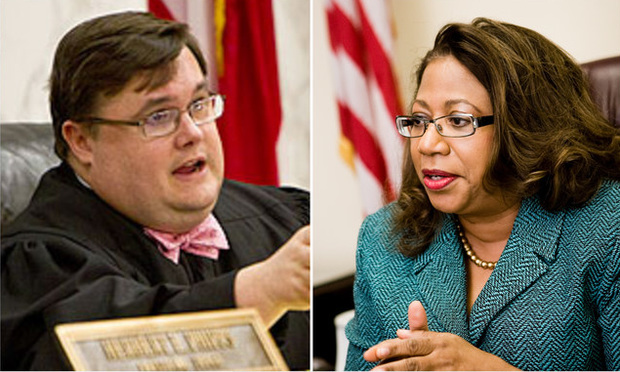'Snarky Comments,' 'Watering Down' and Other Things Judges Hate, Per Bench Panel
An appellate lawyer recently had an opportunity to turn the tables on a panel of judges at the State Bar of Georgia headquarters building in Atlanta for a conference on “Handling Big Cases."
April 23, 2018 at 08:53 AM
4 minute read

An appellate lawyer recently had an opportunity to turn the tables on a panel of judges at the State Bar of Georgia headquarters building in Atlanta for a conference on “Handling Big Cases.”
Michael Terry of Bondurant Mixson & Elmore—who has answered countless questions from panels of judges in oral arguments—did the asking for a change. The April 13 program title was 'Handling Trials & Appeals More Professionally.” The panel included: Douglas County Superior Court Judge Cynthia Adams, Fulton County State Court Judge Jane Morrison, Georgia Court of Appeals Judge M. Yvette Miller and Court of Appeals Chief Judge Stephen Dillard. When it was over, Terry had teased out some rare revelations from judges about what they really don't like.
Based on the answers to Terry's questions, here are 10 tips on what not to do in front of a judge.
1. Play to the cameras. Terry asked the judges if they encounter “lawyers putting on a show” in big cases. Morrison answered with a question: “Is that just big cases? All the world's a stage,” she said. Dillard reported that he saw “some of that” when cameras were present before the court began live stream and video coverage of all oral arguments. Now, he said, “everyone forgets the cameras are there.”
2. Be nasty. “Once in a while, we see snarky comments,” Miller said, particularly when the stakes are high. “We don't like to see that.”
3. Bring up an issue on appeal that wasn't argued in the court below. Dillard said he's seen lawyers ask the Georgia Supreme Court to review Court of Appeals decisions and slip in new arguments. The justices don't fall for it. “They will call you out,” Dillard said. “I've seen it over and over.”
4. Read from the briefs. All the judges—appellate and trial court—said they read the briefs before they hear arguments. “Tell me something I haven't already heard,” Morrison said. “I want to hear something else from you if you got it.”
5. Write an excessively long brief. “There's a danger to your credibility if you are throwing everything you've got into the brief,” Dillard said. “Be careful about watering down your strongest points by putting in weaker ones.”
6. Let the client bring in a rowdy entourage. “It's the duty of the lawyer to keep the client in line—and the witnesses and their groupies sitting behind you,” Morrison said. “The judges can see it all.”
7. Seal records unnecessarily. The judges said they're encountering more of this with electronic filing because it's so easy to “hit the seal button” when it's not necessary. They said they're having to hold hearings to unseal documents. Morrison warned that, if lawyers seal documents improperly, she opens them until the hearing. “There'll be 10 days of an open window before a hearing,” she said.
8. Flat-out lie. This came up in answer to a question from the audience: What to do when opposing counsel makes up facts and lies. “You have a duty to report that lawyer to the bar,” Dillard said. “If that's going on, it's the end of the case.”
9. Be a sore loser. The judges said they can assess lawyers' character and professionalism by watching how they deal with defeat. Adams said she saw this even in her first year on the bench. Her advice: “If it doesn't go in your favor, take it with a smile and show your frustration later—maybe in your car.”
10. Forget what's most important. For better or worse, lawyers leave lasting impressions with judges that carry over to their future cases. Dillard cautioned several times to “remember no case is worth your reputation, no matter how big it is.”
This content has been archived. It is available through our partners, LexisNexis® and Bloomberg Law.
To view this content, please continue to their sites.
Not a Lexis Subscriber?
Subscribe Now
Not a Bloomberg Law Subscriber?
Subscribe Now
NOT FOR REPRINT
© 2025 ALM Global, LLC, All Rights Reserved. Request academic re-use from www.copyright.com. All other uses, submit a request to [email protected]. For more information visit Asset & Logo Licensing.
You Might Like
View All

On The Move: Ex-Partner Returns to Lead Nelson Mullins Corporate Group, Burr & Forman Hires University GC as COO
5 minute read
Law Firm Sued for Telemarketing Calls to Customers on Do Not Call Registry

Evidence Explained: Prevailing Attorney Outlines Successful Defense in Inmate Death Case
Trending Stories
- 1New York-Based Skadden Team Joins White & Case Group in Mexico City for Citigroup Demerger
- 2No Two Wildfires Alike: Lawyers Take Different Legal Strategies in California
- 3Poop-Themed Dog Toy OK as Parody, but Still Tarnished Jack Daniel’s Brand, Court Says
- 4Meet the New President of NY's Association of Trial Court Jurists
- 5Lawyers' Phones Are Ringing: What Should Employers Do If ICE Raids Their Business?
Who Got The Work
J. Brugh Lower of Gibbons has entered an appearance for industrial equipment supplier Devco Corporation in a pending trademark infringement lawsuit. The suit, accusing the defendant of selling knock-off Graco products, was filed Dec. 18 in New Jersey District Court by Rivkin Radler on behalf of Graco Inc. and Graco Minnesota. The case, assigned to U.S. District Judge Zahid N. Quraishi, is 3:24-cv-11294, Graco Inc. et al v. Devco Corporation.
Who Got The Work
Rebecca Maller-Stein and Kent A. Yalowitz of Arnold & Porter Kaye Scholer have entered their appearances for Hanaco Venture Capital and its executives, Lior Prosor and David Frankel, in a pending securities lawsuit. The action, filed on Dec. 24 in New York Southern District Court by Zell, Aron & Co. on behalf of Goldeneye Advisors, accuses the defendants of negligently and fraudulently managing the plaintiff's $1 million investment. The case, assigned to U.S. District Judge Vernon S. Broderick, is 1:24-cv-09918, Goldeneye Advisors, LLC v. Hanaco Venture Capital, Ltd. et al.
Who Got The Work
Attorneys from A&O Shearman has stepped in as defense counsel for Toronto-Dominion Bank and other defendants in a pending securities class action. The suit, filed Dec. 11 in New York Southern District Court by Bleichmar Fonti & Auld, accuses the defendants of concealing the bank's 'pervasive' deficiencies in regards to its compliance with the Bank Secrecy Act and the quality of its anti-money laundering controls. The case, assigned to U.S. District Judge Arun Subramanian, is 1:24-cv-09445, Gonzalez v. The Toronto-Dominion Bank et al.
Who Got The Work
Crown Castle International, a Pennsylvania company providing shared communications infrastructure, has turned to Luke D. Wolf of Gordon Rees Scully Mansukhani to fend off a pending breach-of-contract lawsuit. The court action, filed Nov. 25 in Michigan Eastern District Court by Hooper Hathaway PC on behalf of The Town Residences LLC, accuses Crown Castle of failing to transfer approximately $30,000 in utility payments from T-Mobile in breach of a roof-top lease and assignment agreement. The case, assigned to U.S. District Judge Susan K. Declercq, is 2:24-cv-13131, The Town Residences LLC v. T-Mobile US, Inc. et al.
Who Got The Work
Wilfred P. Coronato and Daniel M. Schwartz of McCarter & English have stepped in as defense counsel to Electrolux Home Products Inc. in a pending product liability lawsuit. The court action, filed Nov. 26 in New York Eastern District Court by Poulos Lopiccolo PC and Nagel Rice LLP on behalf of David Stern, alleges that the defendant's refrigerators’ drawers and shelving repeatedly break and fall apart within months after purchase. The case, assigned to U.S. District Judge Joan M. Azrack, is 2:24-cv-08204, Stern v. Electrolux Home Products, Inc.
Featured Firms
Law Offices of Gary Martin Hays & Associates, P.C.
(470) 294-1674
Law Offices of Mark E. Salomone
(857) 444-6468
Smith & Hassler
(713) 739-1250






